Market overview of Pt100 thermometers
Choosing the right Pt100 temperature sensor is crucial for precise temperature measurements in various industrial applications. Pt100 temperature sensors are based on the resistance of platinum at different temperatures, which makes them a reliable choice for precise measurements.
DIN standardised Pt100 temperature sensors
Some designs of Pt100 resistance thermometers are standardized in DIN and thus allow easy interchangeability, even of products from different manufacturers. In addition, there are a large number of very different variants of Pt100 resistance thermometers that have proven themselves for specific applications or are built to customer specifications.Almost all manufacturers can supply all variants, i.e. ultimately it is mainly quality, service, delivery time and price that decide which supplier to choose.
Pt100 thermometer with approval
Pt100 temperature sensors, which are used in potentially explosive atmospheres, represent a restriction in the selection of the supplier. The manufacturing company requires a licence for this.If special certificates (e.g. SIL) are required, there is a further restriction of the suppliers available forselection.
If the highest accuracy of the Pt100 temperature sensors is required, it is often helpful to select a supplier with a PTB (Physikalisch-Technische Bundesanstalt) accredited test laboratory. This ensures that the products supplied meet the highest quality standards. The PTB is the national metrology institution in Germany and stands for the highest precision and reliability in measurement technology. A test laboratory that is accredited by the PTB has fulfilled strict requirements and proven its capabilities in terms of measurements and calibrations.
Overview of the most common designs
Below is a brief overview of the most common designs on the market for special applications.The link to the data sheet of an example supplier is included for a more detailed description.
Pt100 resistance thermometer for general applications
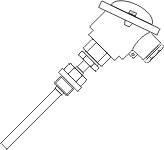
Measuring range: -198 to +600°C
Connection: thread, flange, weld-in sleeve
Electr. connection: terminal head
Immersion tube material: st. steel
Sensor: Pt100, 2-, 3- oder 4-Leiter, class A, B, 1/3 or 1/10 DIN
Option: 4 - 20 mA, HART®, Profibus® PA, Fieldbus®
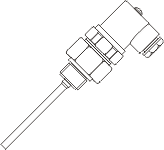
Measuring range: -50 to +250°C
Connection: thread 1/4-1/2", M12, M20
Electr. connection: angle plug acc. DIN EN175301-803 form A
Immersion tube material st. steel
Sensor: Pt100, 2-, 3- oder 4-Leiter, Klasse A or B
Option: 4 - 20 mA
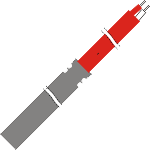
Measuring range: to +235°C
Connection: optional compression fitting, thread
Electr. connection: cable
Sensor housing: st. steel
Sensor: 1xPt100 class A, B, 1/3, 1/5, 1/10 DIN
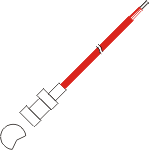
Measuring range: -50 to +200°C
Connection: with pipe clamp
Electr. connection: cable
Sensor housing: Aluminium
Sensor: 1xPt100
Pt100 resistance thermometer for specific industries
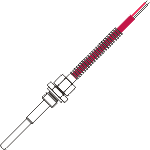
Measuring range: 0 to +600°C
Connection: Thread G 1/4, G 1/2, M20
Electr. connection: cable
Immersion tube material: st. steel
Sensor: 1x Pt100, 2xPt100 3-Leiter, class 1 or B
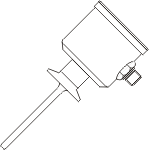
Measuring range: -50 to +250°C (-200 to +400°C)
Connection: CleanAdapt, Tri-Clamp, Varivent, Thread
Electr. connection: st. steel terminal head
Immersion tube material: st. steel
Sensor: 2xPt100 3-Leiter, class A, AA or AAA
Option: 4-20 mA, I/O-Link
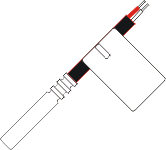
Measuring range: 0 to +180°C
without for insertion Connection: without for insertion
Electr. connection: cable
Sensor husing: st. steel
Sensor: 1xPt100 2-or 4-Leiter
Option: paired with certificate of conformity